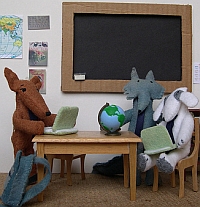I am Luis Ramirez, a member of the committee in charge of the citizen-led campaign One Computer Per Child (Chile). One common mistake found when approaching OLPC campaigns is to think in terms of the wrong constituency.
The aim should always be to convince politicians (ministers or members of parliament heading the governmental coalition), and educators (in schools and in the ministry of education). The constituency that matters to those groups are the kids (schoolchildren) and above all, their parents which are potential voters. Geeks -broadly defined as IT enlightened people- are not in the equation.
But, how can they be left behind? After all, the advantages of the XO machines are so clear to the geek crowd. For them, OLPC is not less than their 'final fantasy', that is, the natural embodiment of a better world endorsed by mesh networking, limitless capacity to hack the code, and above all, a Microsoft-free environment. Yet, in principle, none of those things are a priority to the constituency that matters. They care about children, not about computers.
Accordingly, you can go and explain with a cheerful (but for most people tedious) discourse all the technicalities of this marvel of engineering. Yet, you will not get all the due attention from parents and educators. Make no mistake: Everybody is amazed by the XO, but unfortunately I still don't see dozens of developing nations running after Negroponte to be firsts to have it. What I see though, is every single developing nation trying to improve their educational system. That is what really matters.
For that reason, the Chilean campaign 'One Computer per Child' places the machine at the end - and not at the beginning - of our public discourse. We are usually talking about education, inequality, lack of opportunities, under-development, empowering kids, poverty reduction, reforming public schools, national competitiveness, and yes, computers as a tool to do just that.
We in fact use OLPC as the BEST EXAMPLE of the technologies available today for boosting children's education. But we are not focusing on the technical advantages of the OLPC project as THE central point of our campaign. Neither have we made a definite statement about OLPC as the only possible solution for our schools.
That's why we also welcomed Intel's Classmate. We are also endorsing similar efforts by other American vendors and international projects such as those announced in China and India.
Following this approach, we try to think in terms of the most anti-geek character you may possibly imagine. Something like those Aunties or Grannies that know almost nothing about computers but that clearly understand that they are important for the kids' future. We appeal to their common sense, not to their technical knowledge. And we tell them, just incidentally, at the end of our presentations: 'Have a look of this wonderful machine.
A group of the most intelligent people in the planet, led by a 'genius gringo', has produced this computer, which is entirely conceived to give the kids all the tools they need to get a better future'.
That is also the reason why we have sought a friendly iconic image to promote our campaign. We asked Lizette Greco, a Chilean artist based in California, to design something close to a mother, a kid and all their relatives ( which by definition is also close to politicians). The result was the lovely, super-cute and frankly irresistible Pudu.
And what exactly is a Pudu you may ask? Well, it is the world smallest deer, and lives in the Andean region between Chile and Argentina. That is, something we all know, we feel close to and that somehow is far away from the coldness of a computer.
So, for all the people from the Latin American region (or actually any developing nation) asking about our campaign and the way we promote the technical advantages of the XO machine, our suggestion, to sum up, would be this: Put the XO at the end, and place the kids first. Talk to the people that care about kids and then (if you have the time), talk to the people that care about computers. It may work.
This article is also published on Audentes Fortuna Iuvat.





Please see my post here
http://www.murga-linux.com/puppy/viewtopic.php?p=112428#112428
You may find Puppylinux turns old laptops into a very child friendly computer system
Download here
http://www.puppylinux.org/user/downloads.php
Dear Luis,
putting children first and hardware last is obviously the better approach than the other way around. However, there are also things between the two like the teaching method. Along with the XO's goes OLPC's strong tendency towards constructivism theory in a rather radical version according to Prof. Negroponte's remarks about having no need for teachers anymore.
What are your plans about teaching methods in your country and how do you communicate/propagate them? Who decides on them? Who takes the strongest influence? I guess there are different parties involved like the ministry of education, teachers, parents, OLPC(Chile), Intel/Classmate project in Chile. What are their attitudes on the teaching methods? Are there any quantitative results from pilot projects in your country on the effectiveness of different learning methods that could support the decision makers?
Thanks for sharing your experiences,
Roland
That pudu thing is genius! I think you totally have the right idea. Good luck producing more awesome artwork.